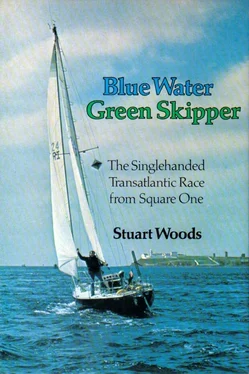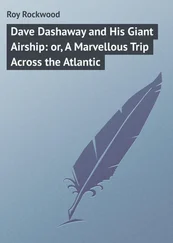The great white shark/torpedo was a dolphin, the first I had ever seen at night. Now I saw that there was a pair. They did their torpedo act again and again, driving at the yacht, then veering away at the last possible second. Since they provided their own lighting in the phosphorescence, I could clearly see their shapes and features, their smooth gray skins. I sat, transfixed, for nearly half an hour as they played their game, having the time of their lives, then they were gone.
We had altered our watch-keeping system now, and we were both well rested. After passing over the continental shelf and leaving the trawler fleets behind, we were in much less danger of collision, being off the most heavily traveled shipping lanes. Now one of us would stay dressed all night, ready to go on deck if necessary but not keeping a constant lookout. One night, when I was on watch, I was dozing lightly in my berth, when I became aware that Bill had awakened and was going on deck. I returned to my doze, thinking he had gone up to pee, but suddenly the yacht tacked. A moment later Bill came below again. “I think I must have developed some sort of ESP in submarines during the war,” he said. “I just woke up and knew I had to go on deck. We were on a collision course with a very large ship.” I looked out of the hatch and saw the enormous thing about three hundred yards astern by then. I made a mental note always to sail with people who were former submariners, and I wondered if I would ever become that attuned to what was happening around the boat.
We settled into a routine aboard, a routine ruled by the constant strain of being hard on the wind. When a small yacht is beating to windward she will suffer more fore and aft motion and heel more sharply than on any other point of sailing. Harp ’s motion was very kindly for a yacht of her size, but it is the heeling of the boat which is the most tiring feature of beating. When the boat is heeled at, say, a constant angle of twenty degrees from the vertical, life aboard becomes a continuous struggle with the law of gravity. One is always traveling either uphill or downhill and never on a level path. Ordinary tasks, like eating, become much more entertaining and exciting. I had equipped the galley with some very attractive American dinnerware, each plate of which had a rubber ring around the bottom which, the ad stated, kept the plate from sliding off the table even at a thirty-degree angle of heel. The ad was absolutely correct; the plates did adhere at that angle. But what the manufacturers had neglected to point out was that, while the plate would remain firmly in place at a thirty-degree angle of heel, the food slides off the plate into your lap. We learned to eat everything from bowls and to hold firmly on to them. They might not tip over or slide when heeled, but the suspense was unbearable.
We ate well. In spite of the rigors of beating, I cooked a hot breakfast every morning until the bacon ran out, and we had a hot dinner every night and shared a bottle of wine. Bill, who had a firm rule of no alcohol when single-handing, relaxed this stance when sailing in company. I think it made us both better company. In the evenings we talked endlessly and listened to tapes from the Monty Python TV series. Bill had never heard of Monty Python, Irish television not having worked up enough courage to broadcast the series to the west of Ireland, and we were both often convulsed. We had a broad range of audio entertainment at our command — the Python tapes, music ranging from Vivaldi to Simon and Garfunkel and, of course, the BBC World Service on shortwave. We even got Radio 2 until we were about eight hundred miles out.
We remained fairly busy, apart from sailing the boat. I practiced my celestial navigation, comparing my positions with Bill’s, and they began to come close. I read a lot, too, getting through Anita’s excellent biography of Francis Chichester and a couple of novels. Occasionally, a ship would turn up and we made efforts to communicate. Since the range of our little Seavoice VHF radio-telephone was only about forty miles, we could not communicate directly with land, so I had an idea for sending telegrams via other ships. Merchant shipping did not keep a watch on VHF, using it mostly for port operations, so I kept the signal flags KVHF ready for hoisting. K is the international signal for “I wish to communicate with you.” VHF, I figured, was self-explanatory.
When we saw our first ship, we got the flags up in a hurry and switched on the radio. Nothing. I lit a white flare. Still nothing. We figured we had not seen him soon enough, and since he was abeam, overtaking us, by the time we got the flags up, he probably hadn’t noticed.
Another day, a tiny fishing boat turned up from nowhere. He was apparently a tuna fisherman and the boat was so low in the water that it approached us unnoticed. It had not occurred to us that there would be fishing boats this far from land. He ran alongside us for a few minutes, and in spite of the flags and Bill’s efforts in French over the loud-hailer (the boat was from a southwest France port) we failed to make him understand that we wanted him to switch on his radio. With lots of friendly waving he disappeared over the horizon.
Our second attempt at a merchant ship bore fruit. We saw it early and had the flags up in plenty of time. I was screeching out “K” on the hooter as the ship came up to us, and soon I had her radio operator on the VHF. She was an Italian grain carrier, the Mario Z, under charter to the Russians to ferry wheat from New Orleans to Leningrad, and she was on her way to the States in ballast. I chatted with the radio operator, a Spaniard, for some time, and he kindly agreed to send telegrams home for us. All merchant mariners, I believe, are bored out of their skulls and perfectly delighted to pass the time of day with a small yacht in the middle of nowhere. It breaks up their day.
Talking with the ship had made our day, too, and there was better to come. For the first time since leaving England, we were freed. The wind backed and we were, at last, reaching. We had two lovely days of it, screaming along in bright sunshiny weather, clocking up our best runs of the passage. Our very best noon-to-noon run was 148 miles. It began to look as if we would make Horta in time for the competitors’ dinner on Saturday night, the sixteenth, and our spirits rose markedly. It had been depressing beating, beating, beating, sometimes laying our course, but even then hard on the wind. This was beautiful sailing, and we began to speculate about what Horta would be like. Bill had sailed past the Azores but had not stopped there, and I knew only what I had seen in a tourist brochure the race committee had sent.
We raised another ship, a German this time, and sent a telegram to Horta giving an ETA of Saturday. Spirits were high.
Then we were headed again. Worse, the wind dropped and we began to experience our first light weather, and from the worst possible place, on the nose. Very depressing. But I was learning an important lesson — that the sea doesn’t care when you arrive, or if you arrive at all. The sea is indifferent to the desires of those who sail upon her, and no amount of sulking or swearing will change that. One learns patience at sea, and always the hard way.
Bill got hurt. He had opened a locker under a settee berth and, having forgotten that he had left the lid off, sat down, falling into the locker, the edges striking him around the kidneys. He was obviously in a lot of pain, and I was worried. There was nothing in our super-duper medical kit, at least, nothing I knew how to use, which would help a ruptured kidney. We were relieved when Bill didn’t pass any blood, and we thought that the worst it could be was a bruised kidney. The worst of the pain passed, and although Bill was very sore and uncomfortable, he insisted on doing all the work he usually did, which was plenty. The only concession he made to his injury was to wear a normal safety harness instead of the length of rope he usually wore around his waist.
Читать дальше












